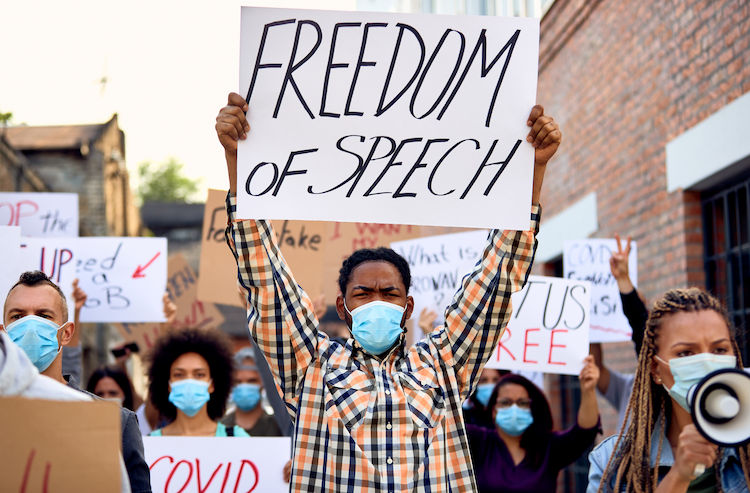
In Sanjuan v. School District of West New York (A-45-22/087515) (Decided February 12, 2024), the Supreme Court of New Jersey clarified an arbitrator’s authority under the Tenure Employees Hearing Law. According to the court, the statute provides the basis to refer a case to arbitration but does not limit an arbitrator’s authority to impose penalties.
Facts of Sanjuan v. School District of West New York
Plaintiff Amada Sanjuan worked assistant principal of Memorial High School and had acquired tenure both as a teacher and as an assistant principal when Defendant, the Board of Education for the Town of West New York Public Schools, certified tenure charges against her for conduct unbecoming. Sanjuan reported that she fell down a staircase at the school after reaching to pick up a piece of paper. However, security footage revealed that after Sanjuan fell, she reached into her pocketbook, took out a piece of paper, set it down in the middle of the staircase, and then resumed her position on the floor.
Under the Tenure Employees Hearing Law (TEHL), N.J.S.A. 18A:6-10 to -18.1, the State Commissioner of Education is required to refer a tenure case to arbitration upon determining that the charges are “sufficient to warrant dismissal or reduction in salary of the person charged,” which it did in this case. The arbitrator subsequently concluded that the limited scope of the incident and Sanjuan’s long service with the public school district as a teacher warranted a demotion, not termination. He terminated her tenured administrative position but allowed Sanjuan to retain her tenured teaching role. The arbitrator further concluded that Sanjuan’s “failure to take ownership” of her misdeed “warrants that her reinstatement . . . be without backpay.”
Sanjuan filed a verified complaint and order to show cause seeking to vacate the arbitration award and to be reinstated as a tenured administrator with backpay. The trial court confirmed the arbitration award. The Appellate Division vacated the trial court’s order, holding the language of N.J.S.A. 18A:6-16 constrains the arbitrator to impose only the penalties of dismissal or reduction in salary, not demotion. In support, the appeals court noted that “[n]owhere does the statute provide that an employee can be demoted.”
NJ Supreme Court’s Decision in Sanjuan v. School District of West New York
The New Jersey Supreme Court reversed and reinstated the arbitration award. According to the court, N.J.S.A. 18A:6-16 provides the basis to refer a case to arbitration but does not limit an arbitrator’s authority to impose penalties.
In reaching its decision, the New Jersey Supreme Court reviewed the history of the TEHL from its enactment in 1967 through its amendment in 2012 via the Teacher Effectiveness and Accountability for the Children of New Jersey Act (TEACHNJ).
“Although the TEACHNJ amendments to the TEHL changed the entity that makes the final determination in a case, it did not make any changes as to what could or should be the final determination,” Justice Lee A. Solomon wrote. “Arbitrators have the same discretion to impose penalties under the post-TEACHNJ version of the TEHL as did the hearing officer under the pre-amendment version of the statute.”
The New Jersey Supreme Court next addressed the arbitrator’s authority under N.J.S.A. 18A:6-16, emphasizing that although the statute limits the cases that reach the arbitrator, it does not limit the remedies available to the arbitrator.
“That construction sets forth the conditions under which a matter must be referred to arbitration by the Commissioner; it does not set forth, limit, or in any way address the penalties that may be imposed by an arbitrator to whom a matter is referred,” Justice Solomon wrote. “If the Legislature had wanted to limit the possible penalties that a tenured employee could face under the amended statute, it could have done so. Instead, the Legislature included in the TEHL only the conditional ‘if x, then y’ jurisdictional trigger of N.J.S.A. 18A:6-16 that informs the Commissioner when a case must be submitted to binding arbitration.”
He added: “Although the legislation limits the cases that reach the arbitrator, it does not limit the remedies available to the arbitrator. And that remains the case even after the 2012 TEACHNJ amendments to the TEHL, under which the arbitrator’s discretion was not circumscribed despite the change in the person to whom the contested charge is submitted.” Because N.J.S.A. 18A:6-16 does not limit the possible penalties to reduction in salary and termination, and because there was no contractual agreement that sets limits beyond those imposed by the TEHL, the New Jersey Supreme Court found that the arbitrator did not exceed his powers in demoting Sanjuan and instead correctly determined a penalty tailored to this case.

In State v. Curtis L. Gartrell (A-31-22/087597) (Decided January 17, 2024), the Supreme Court of New Jersey held that a defendant who left a suitcase behind when fleeing police did not have standing to challenge law enforcement’s warrantless search of the bag.
Facts of State v. Gartell
During the evening of November 6, 2019, an individual at Newark Penn Station reported to New Jersey Transit Police Officers that he had been punched by defendant Curtis Gartrell. As officers spoke to the Defendant, there was a blue rolling suitcase near him. The officers ran a search for outstanding warrants against the Defendant. While waiting for the results of the record check, the Defendant had several phone conversations with a person he referred to as “Spoon” and “bro,” who he claimed was coming to pick him up.
After the results of the record check revealed an active warrant, the officers informed the Defendant that they intended to place him under arrest. Defendant asked the officers whether he could first give his luggage to “Spoon,” but they declined the request, stating they would first take defendant into custody. Defendant called out, “‘Spoon,’ will you get my clothes, bro,” and turned as if preparing to be handcuffed; he then fled from the officers on foot, leaving the blue suitcase unattended on the sidewalk.
While other officers chased and arrested defendant, one officer secured and searched the suitcase at the entrance of the station, revealing the contraband. The Defendant was charged with possessory offenses and resisting arrest and subsequently filed a motion to suppress evidence recovered from the warrantless search of the suitcase. The trial court granted the motion, reasoning that the Defendant did not flee police because he wanted to discard the suitcase or relinquish his interest in it. The trial court also rejected the State’s argument that the search incident to arrest exception applied. The State appealed, and the Appellate Division reversed, holding that the Defendant had abandoned the suitcase.
NJ Supreme Court’s Decision in State v. Gartell
The New Jersey Supreme Court affirmed. It held that the Defendant’s possessory or ownership interest in the suitcase ended when he fled police outside Penn Station and deliberately left his suitcase behind in a public place with no evidence of anyone else’s interest in the bag. The Court further held that because the State demonstrated by a preponderance of the evidence that the suitcase was abandoned, the Defendant lacked standing to challenge its seizure and search.
Citing State v. Johnson, 193 N.J. 528, 548 (2008), the New Jersey Supreme Court first emphasized that when property is abandoned, the defendant has “no right to challenge the search or seizure of that property.” Under Johnson, property is abandoned only if “(1) a person has either actual or constructive control or dominion over property; (2) he knowingly and voluntarily relinquishes any possessory or ownership interest in the property; and (3) there are no other apparent or known owners of the property.”
Writing for the majority, Justice Solomon went on to note that the Court held in Johnson that the defendant had not surrendered his standing to challenge the search of a bag solely because he had disclaimed ownership, given that the bag was in an apartment with five occupants and could have belonged to any one of them. He further noted in Johnson the Court placed great significance on the fact that the “the police might still have easily determined its owner.”
Justice Solomon contrasted the Court’s Johnson decision with State v. Carvajal, 202 N.J. 214, 225 (2010). In Carvajal, the Court upheld the search of an unattended bag left on a bus after finding that the bag was abandoned because it was “left in a public place or on a public carrier” with “no apparent owner,” and the “police did not search the bag until all apparent owners had disclaimed any possessory interest in the property.”
In the current case, the New Jersey Supreme Court found that the Defendant abandoned the suitcase. “The act of fleeing to avoid a lawful arrest in a public place demonstrates defendant’s intent to place as much distance as possible between himself and the property left behind,” Justice Solomon explained. “When defendant ran from police in the heavily trafficked area on the sidewalk outside of Penn Station, without any indication that he intended to return, he abandoned the suitcase in a public place.”
The Court further concluded that the Defendant’s vague references to “Spoon,” who was never unidentified, do not rise to the level of an indication of ownership and control. “And, unlike when there are a finite and fixed number of potential owners as in Carvajal and Johnson, the police cannot be expected to identify and canvass everyone at or near a major transportation hub to determine who, if anyone, might have a possessory interest in a bag deliberately left behind in a public place,” Justice Solomon wrote.
In AC Ocean Walk v. American Guarantee and Liability Insurance, (A-28-22/087304) (Decided January 24, 2024), the Supreme Court of New Jersey held that the presence of the COVID-19 virus did not constitute the kind of “direct physical loss or damage” required to support a business-interruption insurance claim.
Facts of AC Ocean Walk v. American Guarantee and Liability Insurance
In 2018, Ocean Walk opened Ocean Casino Resort, located on the Atlantic City Boardwalk. Ocean Walk obtained property insurance policies from defendants American Guarantee and Liability Insurance Company, AIG Specialty Insurance Company, and Interstate Fire & Casualty Company.
After suffering losses due to the COVID-19 pandemic, plaintiff AC Ocean Walk, LLC (Ocean Walk) sought coverage under its commercial property insurance policies. Ocean Walk closed its facilities in March 2020 and then reopened them in July 2020, both in accordance with Executive Orders issued by Governor Philip D. Murphy.
Ocean Walk maintained that by virtue of the presence of SARS-CoV-2 in its facilities and its government-mandated temporary suspension of operations, it sustained a “direct physical loss” of or “direct physical . . . damage” to its property as those terms are used in the insurance policies issued by defendants. Ocean Walk further argued that an exclusion in the policies for certain claims based on “contamination” did not bar its coverage claims.
The property insurance policies issued by defendants set forth identical base policy forms. Each policy provided that it insured “against direct physical loss of or damage caused by a Covered Cause of Loss to Covered Property, at an Insured Location,” subject to the terms, conditions, and exclusions stated in the policy. Each policy contained a “contamination exclusion” providing in part that — “unless it results from direct physical loss or damage not excluded by this Policy” — “Contamination, and any cost due to Contamination including the inability to use or occupy property or any cost of making property safe or suitable for use or occupancy” is excluded.
When the defendants denied coverage — aside from agreeing to pay their proportionate shares of a $1,000,000 sublimit under the policies’ Interruption by Communicable Disease amendatory endorsement — Ocean Walk filed a complaint. All defendants moved to dismiss the complaint for failure to state a claim.
The trial court concluded that Ocean Walk had adequately pled facts supporting a finding of “direct physical loss” of or “direct physical . . . damage” to its property because it had alleged that due to the SARS-CoV-2 virus, it was unable to “operate its gaming floor and hotel rooms” or to “operate according to its essential functions.” Citing Nav-Its, Inc. v. Selective Insurance Co. of America, 183 N.J. 110, 118-24 (2005), the trial court further found the contamination exclusion inapplicable to the claims asserted. The Appellate Division reversed the trial court’s denial of the motions to dismiss filed by the defendants.
NJ Supreme Court’s Decision in AC Ocean Walk v. American Guarantee and Liability Insurance
The New Jersey Supreme Court affirmed. “We agree with the Appellate Division that Ocean Walk did not allege facts supporting coverage under the policy language in dispute, and that the deficiency in its allegations cannot be remedied by discovery,” Justice Anne M. Patterson wrote on behalf of the Court. The Court further held that even if Ocean Walk had pled facts supporting a finding of a covered “loss” or “damage,” the losses it alleges are excluded from coverage by the policies’ contamination exclusion.
The New Jersey Supreme Court first found that Ocean Walk failed to allege facts supporting coverage under the policy language in dispute. “Based on the plain terms of the policies, we conclude that in order to show a ‘direct physical loss’ of its property or ‘direct physical . . . damage’ to its property under the policy language at issue, (parent company AC Ocean Walk LLC) was required to demonstrate that its property was destroyed or altered in a manner that rendered it unusable or uninhabitable,” Justice Patterson wrote.
The Court went on to find that absent the executive orders, Ocean Walk would have been able to use its property for casino and other entertainment functions with no suspension of its operations. “At most, it has alleged that it sustained a loss of business during the COVID-19 government-mandated suspension of business operations because it was not permitted to use its property as it would otherwise have done,” Justice Patterson wrote.
The New Jersey Supreme Court also addressed the contamination exclusion. “Although it is not strictly necessary given our conclusion that Ocean Walk did not allege facts to establish a ‘direct physical loss’ of or ‘direct physical damage’ to its property, we nonetheless briefly address Ocean Walk’s argument that the contamination exclusion in the policies issued by AGLIC, AIG, and IFCC does not apply here,” Justice Patterson wrote. According to the Court, presence of SARS-CoV-2 in Ocean Walk’s facilities falls squarely within the description of “contamination” in the policies. It also found that its decision in Nav-Its did not alter that conclusion. “Here, in contrast, the contamination exclusion in the policies at issue bars coverage not only for certain claims premised on loss or damage caused by a ‘pollutant’ but also for certain claims premised on loss or damage resulting from other causes,” Justice Patterson explained. “Those causes include the presence of a ‘virus’ or a ‘pathogen or pathogenic organism’ on covered property. The exclusion’s terms do not support the limited reading that Ocean Walk advocates.”

In State v. Calvin Fair (A-20-22/086617) (Decided January 16, 2024), the Supreme Court of New Jersey incorporated the U.S. Supreme Court’s recent decision in Counterman v. Colorado, 600 U.S. 66, 79 (2023) to hold that a mental state of recklessness is constitutionally sufficient for a “true threats” prosecution under N.J.S.A. 2C:12-3(a). The Court further held that an objective component is also necessary for a prosecution for a threat of violence under N.J.S.A. 2C:12-3(a) to survive First Amendment and Article I, Paragraph 6 scrutiny.
Facts of State v. Fair
In February 2015, State Police seized several handguns from defendant Calvin Fair’s home. In April 2015, defendant referenced the search on Facebook, noting that none of the guns the police found were his and that he still had all of his guns.
On May 1, 2015, officers responded to a domestic-violence call at defendant’s home. After a few verbal exchanges with an officer, defendant yelled: “Worry about a head shot, [epithet].” At no point did defendant brandish a weapon. About two hours after the officers left, defendant made Facebook posts stating in part, “THN YU GOT THESE . . . OFFI$ERS THINKIN THEY KNO UR LIFE!!! . . . . I KNO WHT YU DRIVE & WHERE ALL YU MOTHERFU$KERS LIVE AT[.]”
After reviewing the public posts, police issued a terroristic threats complaint against defendant. An officer testified that in addition to the “[w]orry about a head shot” comment, he was concerned from the Facebook posts that defendant still had his guns and knew where the officers lived and what cars they drove.
N.J.S.A. 2C:12-3(a) provides that a person is guilty of third-degree terroristic threats “if he threatens to commit any crime of violence with the purpose to terrorize another or . . . in reckless disregard of the risk of causing such terror or inconvenience.” Under Subsection (b), a “person is guilty of a crime of the third degree if he threatens to kill another with the purpose to put him in imminent fear of death under circumstances reasonably causing the victim to believe the immediacy of the threat and the likelihood that it will be carried out.”
Defendant sought to dismiss the indictment, arguing, among other things, that N.J.S.A. 2C:12-3(a) is unconstitutionally overbroad because it criminalizes terroristic threats made with a mens rea of recklessness. At trial, the State asked that the court charge the jury on N.J.S.A. 2C:12-3(a) and/or (b). And the verdict sheet mirrored the indictment, directing the jury to determine whether the State had proven beyond a reasonable doubt that defendant committed third-degree terroristic threats in violation of N.J.S.A. 2C:12-3(a) and/or (b). During deliberations, the jury sent a note, asking: “Do both 2C:12-3(a) and 2C:12-3(b) have to be proven beyond a reasonable doubt or just one or the other?” With the consent of both parties, the court responded that “it could be . . . one or the other.” Twenty minutes later, the jury reached a guilty verdict.
The Appellate Division reversed, agreeing with defendant both that the “reckless disregard” portion of N.J.S.A. 2C:12-3(a) is “facially invalid.” The appeals court further held that “[w]ithout an instruction that would have made . . . clear to the jury” that they needed to be unanimous on whether defendant violated N.J.S.A. 2C:12-3(a), (b), or both, “we can have no confidence that the jury did not produce an impermissibly fragmented verdict.”
NJ Supreme Court’s Decision in State v. Fair
The New Jersey Supreme Court held that a prosecution for terroristic threats under N.J.S.A. 2C:12-3(a) premised on a mens rea of recklessness is constitutional under the First Amendment and Article I, Paragraph 6 of the New Jersey Constitution. “Defining recklessness in this context as ‘morally culpable conduct, involving a deliberate decision to endanger another,’ Counterman v. Colorado, 600 U.S. 66, 79 (2023), we hold that a mental state of recklessness is constitutionally sufficient for a ‘true threats’ prosecution under N.J.S.A. 2C:12-3(a),” Justice Rachel Wainer Apter wrote.
Departing from Counterman, the New Jersey Supreme Court added another objective element to the test. As Justice Wainer Apter explained: “We also hold that an objective component is necessary for a ‘true threats’ prosecution to survive constitutional scrutiny: the State must prove that a reasonable person similarly situated to the victim would have viewed the message as threatening violence.
In reaching its decision, the New Jersey Supreme Court substantially adopted the Counterman standard. Under this standard, to be found guilty of a violation of N.J.S.A. 2C:12-3(a), a defendant must have consciously disregarded a substantial and unjustifiable risk that their threat to commit a crime of violence would terrorize another person, and that conscious disregard must be a gross deviation from the standard of conduct that a reasonable person in a defendant’s situation would observe.
The New Jersey Supreme Court further ruled that an objective component is necessary for a prosecution for a threat of violence under N.J.S.A. 2C:12-3(a) to survive First Amendment and Article I, Paragraph 6 scrutiny. It departed from Counterman in holding the objective inquiry, in which the jury determines whether a reasonable person would have viewed the defendant’s words as threatening violence, must be undertaken not from the perspective of an anonymous ordinary person, but from the perspective of a reasonable person similarly situated to the victim.
“This is another way of saying that context matters,” Justice Wainer Apter wrote. “Considering the perspective of one similarly situated to the victim, which entails consideration of prior interactions between the parties, protects against convictions for statements made in jest, political dissent, or angry hyperbole, while allowing the State to prosecute true threats of violence that would instill fear of injury in a reasonable person in the victim’s position.”
The New Jersey Supreme Court remanded for a new trial correctly charging the jury on both the objective and subjective components of N.J.S.A. 2C:12-3(a), consistent with its opinion. The Court also instructed that the jury should be charged that they must unanimously agree as to whether defendant violated N.J.S.A. 2C:12-3(a), (b), or both.

In DeSimone v. Springpoint Senior Living, Inc. (A-37-22/087891) (Decided January 10, 2024), the Supreme Court of New Jersey held that the refund provision set forth in N.J.S.A. 56:8-2.11 does not provide relief for all Consumer Fraud Act (CFA) violations. Rather, it is limited solely to the food-related misrepresentations expressly proscribed in Section One of Chapter 347, codified at N.J.S.A. 56:8- 2.9.
Facts of DeSimone v. Springpoint Senior Living, Inc.
Plaintiff William DeSimone brought a class-action suit against defendant Springpoint Senior Living, Inc. (Springpoint). DeSimone alleged that Springpoint violated the CFA with regard to representations about its entrance fee refund policy and sought the return of “all monies received or collected from” them by Springpoint. Plaintiffs relied on N.J.S.A. 56:8-2.11 in seeking that relief.
Codified at N.J.S.A. 56:8-2.9 to -2.13, Chapter 347, also known as the “Truth in Menu Act,” broadened protections for New Jersey consumers by expanding what constitutes an “unlawful practice” to include misrepresentations of the identity of food. Chapter 347 also created a refund remedy, which provides that “[a]ny person violating the provisions of the within act shall be liable for a refund of all moneys acquired by means of any practice declared herein to be unlawful.”
Springpoint moved to dismiss, arguing that N.J.S.A. 56:8-2.11 applies only to misrepresentations regarding food, as outlined in Chapter 347, and not to violations of other CFA provisions. The trial judge denied Springpoint’s motion, stating that she could not “ignore the precedential cases” that the Plaintiffs cited. According to the trial judge, those cases “broadly appl[ied] the refund provision.” The Appellate Division denied leave to appeal.
NJ Supreme Court’s Decision in DeSimone v. Springpoint Senior Living, Inc.
The New Jersey Supreme Court disagreed. It held that the refund provision is limited in scope and that N.J.S.A. 56:8-2.11 provides relief only to victims of food-related fraud as identified in Chapter 347 and does not extend to all CFA violations. “Here, the alleged conduct deals with misrepresentations of a senior living facility’s entrance fee, not food,” Justice Douglas M. Fasciale wrote. “Because those allegations are unrelated to misrepresentations of the ‘identity of food,’ plaintiffs are not entitled to a full refund of their entrance fees under N.J.S.A. 56:8-2.11.”
In reaching its decision, the New Jersey Supreme Court first analyzed the text of Chapter 347’s refund provision, focusing on the plain meanings of “within” and “declared herein.” According to the Court, the use of those terms suggests that N.J.S.A. 56:8-2.11 is limited in application to the provisions of Chapter 347.
In support, the New Jersey Supreme Court noted that in other supplementary CFA statutes, the New Jersey Legislature has used similar language to that found in N.J.S.A. 56:8-2.11 — “the within act” — to explicitly distinguish those supplementary acts from the CFA in its entirety. It further emphasized that Chapter 347 is not the only conduct-specific supplementary statute to provide additional rights and remedies, including consumer refunds. “If the refunds authorized in each supplementary statute applied to the CFA at large, there would be no need for multiple refund provisions,” Justice Fasciale wrote.
The New Jersey Supreme Court next turned to the claims at issue in the case. It noted that the Plaintiffs allege that Springpoint engaged in deceptive advertising practices and provided misleading disclosure statements regarding Springpoint’s return policy of resident entrance fees under its “90% refundable plan.” Because none of the Plaintiffs’ allegations are related to misrepresentations of food, the Court found that the claims are not governed by N.J.S.A. 56:8-2.9 and the refund provision in -2.11 does not apply. The New Jersey Supreme Court entered partial summary judgment in defendants’ favor, dismissing with prejudice the part of plaintiffs’ complaint that sought refund damages under N.J.S.A. 56:8-2.11. It then remanded the matter for further proceedings.

The Supreme Court of New Jersey recently heard oral arguments in Usachenok v. State of New Jersey Department of the Treasury. The case challenges a regulation that requests that state employees involved in discrimination investigations maintain its confidentiality. While the regulation was amended in 2020 to address free speech concerns, the plaintiff maintains that the regulation is still unconstitutional.
Facts of the Case
Plaintiff Viktoriya Usachenok, a former employee of the Department of the Treasury, filed an internal complaint with the Equal Employment Opportunity and Affirmative Action (EEO/AA) office in the Department of the Treasury, alleging that her supervisor sexually harassed her and subjected her to a hostile work environment. At that time, N.J.A.C. 4A:7-3.1(j) included a confidentiality directive not to discuss any aspect of the investigation with others. It stated: “All persons interviewed, including witnesses, shall be directed not to discuss any aspect of the investigation with others in light of the important privacy interests of all concerned. Failure to comply with this confidentiality directive may result in administrative and/or disciplinary action, up to and including termination of employment.”
Usachenok subsequently filed suit. During the pendency of the action, the Civil Service Commission (CSC) amended the regulation to state that investigators would “request” confidentiality and to remove the threat of disciplinary action for non-compliance. Despite the amendment, Usachenok contends that N.J.A.C. 4A:7-3.1(j) creates an unconstitutional prior restraint of state employees’ First Amendment right to freedom of speech and violates the legislative policies behind the New Jersey Law Against Discrimination (LAD).
Appellate Division’s Decision
The Appellate Division rejected the constitutional challenge. It held that the current version of the regulation is enforceable.
According to the Appellate Division, the context of the revised regulation demonstrates that the term “request,” as used in paragraph (j), is a request and not a command. Thus, it does not create a confidentiality requirement. “In fact, we know, as expressed by the CSC, the intent behind the amended regulation was to eliminate a confidentiality requirement and its potential chilling effect rather than create one.”
The Appellate Division also found that the amended regulation supports, rather than contravenes, the policies behind the LAD. “A request for confidentiality promotes a fair investigatory process that protects both the accuser and the accused while respecting the free-speech rights of all participating in an investigation,” the appeals court explained.
Issues Before the NJ Supreme Court
The New Jersey Supreme Court granted certification on May 9, 2023. The justices agreed to consider the following question:
Does N.J.A.C. 4A:7-3.1(j), a civil service regulation governing investigations of discrimination that, as amended in 2020, directs investigators to “request that all persons interviewed, including witnesses, not discuss any aspect of the investigation with others, unless there is a legitimate business reason,” impermissibly restrict protected speech in violation of the First Amendment or the New Jersey Law Against Discrimination?
The Court heard oral arguments on January 3, 2024. Several justices seemed skeptical regarding whether the amended regulation went far enough to remove free speech concerns. “Shouldn’t the request to give up one’s right to speak freely be accompanied by comments that you do not have to, that you have a right not to, that you are not going to be punished if you chose to speak?” asked Chief Justice Stuart Rabner.
Justice Rachel Wainer Apter also raised questions, asking: “If the intention all along in 2020 was that we are completely changing our policy, that we recognize that it harmed victims by telling them that they could not speak and there was a gag order against them and that they would be fired, perhaps, even if they talked to a lawyer or went to the EEOC or DCR to file a complaint of discrimination … how do you square that with the history in this case of the CSC continuing to say this is required?”

In State v. Roberson Burney (A-14-22/086966) (Decided August 2, 2023), the Supreme Court of New Jersey held it was cumulative error for the trial court to admit two pieces of evidence: expert testimony that defendant’s cell phone was likely near a crime scene based on a “rule of thumb” approximation for cell tower ranges in the area, and a first-time in-court identification of defendant by a witness who had previously identified another person as the perpetrator in a photo lineup.
Facts of State v. Burney
Defendant Roberson Burney was convicted of robbery and assault, among other charges, and sentenced to an extended term of life imprisonment without parole. The charges stemmed from an armed robbery at Rosette Martinez’s home. In the days immediately following the home invasion, Rosette was shown two photo arrays, the second of which included a photo of defendant. Rosette misidentified a filler photo in the first photo array with 90 percent certainty and declined to make an identification during the second photo array. One month later, detectives invited Rosette back to the police station and informed her that they had arrested defendant for the robbery of her home.
At trial, the State’s expert, Federal Bureau of Investigation (FBI) Special Agent Ajit David, used defendant’s cell phone records to create maps showing the cell towers with which defendant’s phone made contact on the night of the robbery. Special Agent David gave his expert opinion that the cell towers in the area had an approximate coverage range with a radius of about one mile. That estimated radius was based solely on Special Agent David’s “rule of thumb” for the area — a “good approximation” based on his training and experience. Special Agent David relied on that approximation to place defendant’s cell phone at or near the crime scene at the time of the robbery.
Prior to trial, defense counsel moved to exclude both Special Agent David’s expert testimony and any first-time in-court identification of defendant by any of the victims. Defense counsel argued that Special Agent David’s one-mile approximation was unreliable because it was based on nothing more than his personal experience. Defense counsel further argued that any in-court identification by Rosette was tainted by the detectives’ highly suggestive conduct of telling Rosette defendant’s name and sharing other details of the investigation.
The trial court denied both motions, and the Appellate Division affirmed. It held that the trial court did not abuse its discretion in permitting Special Agent David’s expert testimony or Rosette’s first-time in-court identification. The court found that Special Agent David’s estimated one-mile coverage range was well supported by his knowledge, skill, experience, and training. While the Appellate Division noted that it was suggestive for police to tell Rosette defendant’s name prior to her in-court identification, the court concluded that any weakness in the identification was “fully presented to the jury through skillful cross-examination” and adequate jury instructions.
NJ Supreme Court Decision in State v. Burney
The New Jersey Supreme Court reversed. “[W]e find that the trial court erred in admitting both pieces of evidence,” the Court wrote. “Those errors, in combination, deprived defendant of a fair trial.”
In reaching its decision, the New Jersey Supreme Court first addressed the admissibility of Special Agent David’s testimony. As the Court explained, under New Jersey case law, when an expert grounds testimony in personal views, rather than objective facts, the net opinion rule requires the exclusion of such unsupported views.
Here, Special Agent David testified that a one-mile radius was a “good approximation” as to the coverage area for the relevant cell tower. By Special Agent David’s own admission, he determined the tower range “just based on [his] training and experience.” Additionally, the State offered no outside evidence to support the range.
“We agree with defendant that Special Agent David’s “rule of thumb” testimony constitutes an improper net opinion because it was unsupported by any factual evidence or other data,” the Court found. “[B]ecause the testimony was based on nothing more than Special Agent David’s personal experience, the trial court erred in allowing the jury to hear this testimony.”
The New jersey Supreme Court also found that the trial court erred in admitting Rosette Martinez’s first-time in court-identification. According to the Court, the identification procedure here was highly suggestive. “By telling Rosette defendant’s name, informing her that defendant had been arrested for the robbery, and showing her pictures of the watch found on defendant’s phone, the detective impermissibly influenced and tainted any future identification by Rosette. Additionally, the layout of the courtroom, as Rosette admitted, tipped her off as to where defendant was seated in the courtroom,” the Court wrote.
The New Jersey Supreme Court also found that there was no ‘good reason’ to allow the first-time in-court identification here. “Rosette did not know defendant well prior to the robbery. She testified that she briefly interacted with defendant on two prior occasions, and she was unable to identify defendant — and indeed identified a different person in a filler photograph with 90 percent certainty — when she viewed the photo arrays,” the Court wrote. “There was no basis for an in- court identification under the circumstances.”
Balancing the other evidence presented by the State against the force of the improperly admitted evidence, the Court determined that the cumulative error impacted and prejudiced the fairness of defendant’s trial. Accordingly, it held that the defendant’s conviction and sentence must be vacated and a new trial granted.

The New Jersey Supreme Court recently heard oral arguments in a closely watched case involving the State’s Open Public Records Act (OPRA). The key question before the Court is whether email addresses submitted by members of the public to a public agency to sign up for electronic newsletters and notices are subject to disclosure under OPRA.
Facts of Rise Against Hate v. Cherry Hill Township
Plaintiff Rise Against Hate (RAH) is a 501(c)(3) non-profit corporation which purpose is to raise public awareness about racism and civil rights and to inform the public about the law. Among other things, the organization investigates racial disparities and monitors municipalities to ensure that they, and their agents, employees, law enforcement officers, and officials honor residents’ civil rights. Plaintiff Andrew Jung is a member of the board of advisors of RAH as well as the founder and Chair of Asian Hate Crimes Task Force (AHCTF), a 501(c)(3) non-profit organization that spreads awareness of hate crimes against the Asian community and educates the public about Asian culture, history, and current events.
Jung filed OPRA requests on behalf of RAH and AHCTF with the records custodians of Cherry Hill, West Deptford, and Bridgewater seeking disclosure of email subscriber lists maintained by the municipalities for municipal newsletters and public notices. RAH sought to use the subscriber lists to send unsolicited emails concerning RAH’s activities, investigations, and other matters relating to the civil rights of historically marginalized communities. AHCTF similarly intended to use the subscriber lists to send unsolicited emails to further the organization’s objectives. The records custodians denied the requests after determining that the requested information is protected from public disclosure by the personal privacy provision of N.J.S.A. 47:1A-1.
The trial court ordered disclosure of the requested information. It found that the custodians had not raised a colorable claim that disclosure of the email addresses on the subscriber lists would violate the objectively reasonable expectations of privacy of the subscribers. The court reasoned that disclosure of email addresses would be less invasive of privacy than the disclosure of home addresses, which courts have found to be subject to release when found in government records in some circumstances.
Appellate Division’s Decision in Rise Against Hate v. Cherry Hill Township
The Appellate Division reversed. It held that citizens’ expectation of privacy outweighed the minimal public interest advanced by disclosure of the requested information.
“We conclude members of the public who submit their email addresses to receive electronic newsletters and notices from a municipality have an objectively reasonable expectation that their email addresses will not be disclosed to a non-government organization that intends to send unsolicited emails to them to further the organization’s political and social objectives,” the appeals court held.
Issues Before the NJ Supreme Court
The New Jersey Supreme Court granted certification, agreeing to consider the following question: Are email addresses submitted by members of the public to a public agency to sign up for electronic newsletters and notices subject to disclosure under the Open Public Records Act?
During oral arguments held on November 28, 2023, RAH and AHCTF’s attorney argued that any harm from disclosure of the requested information is likely minimal. “People want to interact with their government, they want to receive information about their government, and that’s what my clients want to send,” C.J. Griffin stated, noting that “there will be many people that are happy to receive it. Others might hit the unsubscribe button.” However, the municipalities maintained that members of the public trusted local governments to safeguard their email addresses and may be deterred from subscribing to municipal newsletters and notices if subscriber lists are subject to public disclosure. “There’s a big difference, I would submit, between providing an email address to an online retailer versus providing an email address to your local government. The expectation is different, and reasonably so,” said Michael J. Miles, attorney representing Cherry Hill.

In State v. Amandeep K. Tiwana (A-36-22/087919) (Decided November 20, 2023), the Supreme Court of New Jersey held that an investigating detective’s self-introduction to the defendant at her bedside in the hospital following a car crash did not constitute a custodial interrogation warranting the administration of warnings under Miranda v. Arizona.
Facts of State v. Tiwana
On April 28, 2020, defendant Amandeep K. Tiwana, while driving in Jersey City, struck a police officer and collided with two police cruisers. Defendant and three injured officers were transported to Jersey City Medical Center. Defendant’s blood alcohol content was 0.268%, three times the legal limit. Detective Anthony Espaillat of the Regional Collision Investigation Unit of the Hudson County Prosecutor’s Office arrived at the hospital and spoke first to the injured officers in the emergency room.
Two uniformed police officers were stationed outside the curtain separating defendant’s bed from other patients. Detective Espaillat walked up to defendant’s bed, introduced himself as a detective with the Hudson County Prosecutor’s Office, and explained that he was assigned to investigate the accident. Espaillat testified that, as soon as he had spoken, defendant immediately complained of chest pain and said, “she only had two shots prior to the crash.” Espaillat directed defendant not to make any other statements. He clarified that he did not come to the hospital to ask her questions and that he wanted to interview her at a later date at the Prosecutor’s Office. The entire interaction lasted “less than five minutes.” The next day, defendant went to the Prosecutor’s Office and invoked her Miranda rights.
A grand jury indicted defendant for three counts of assault by auto. Pretrial, the State moved to admit defendant’s statement at the hospital. Following an evidentiary hearing, the trial court denied the State’s motion and the Appellate Division affirmed. Both courts found that a custodial interrogation occurred at the hospital and the detective’s failure to give Miranda warnings rendered defendant’s statement inadmissible.
NJ Supreme Court’s Decision in State v. Tiwana
The New Jersey Supreme Court unanimously reversed. “As the parties agree, defendant was in custody at the hospital in light of the police presence around her bed area. But no interrogation or its functional equivalent occurred before her spontaneous and unsolicited admission,” the Court explained. “Miranda warnings were therefore not required, and defendant’s statement – that she ‘only had two shots prior to the crash’ – is admissible at trial.”
As the New Jersey Supreme Court explained, the U.S. Supreme Court held in Rhode Island v. Innis, 446 U.S. 291, 300-01 (1980), that “interrogation” for Miranda purposes occurs when a suspect “is subjected to either express questioning or its functional equivalent,” which may include “any words or actions on the part of the police . . . that the police should know are reasonably likely to elicit an incriminating response from the suspect.” At the same time, the Supreme Court emphasized that the police “cannot be held accountable for the unforeseeable results of their words or actions.”
In this case, the New Jersey Supreme Court found that the defendant was not subject to a custodial interrogation or its functional equivalent when she stated that she “only had two shots prior to the crash.” In support of its decision, the Court cited that no questioning occurred, and Espaillat could not have foreseen that his introduction was reasonably likely to elicit an immediate incriminating response. Rather, defendant spontaneously made an unsolicited incriminating statement while in custody.
“Although Detective Espaillat approached defendant after she provided her medical history to hospital staff, he did not engage in what the Supreme Court termed particularly ‘evocative’ conduct reasonably likely to yield incriminating statements from defendant,” the Court wrote. “Rather, defendant spontaneously made an unsolicited incriminating statement while in custody…” With regard to the trial court and Appellate Division’s reliance on the three police officers in or just outside defendant’s bed area at the time Espaillat introduced himself, the New Jersey Supreme Court noted that while that fact alone may establish custody, it does not establish interrogation.

Unlike SCOTUS, the justices of the New Jersey Supreme Court often all agreed with one another this year, reaching August before issuing a single dissent.
The Court’s most precedential decision was Facebook, Inc. v. State, in which the justices unanimously held that Facebook could not be compelled to provide the prospective communications of two users based only on probable cause. Instead, police must go through the more extensive process of obtaining a wiretap order from the court.
“To conduct a search, the State ordinarily must demonstrate there is probable cause to believe evidence of a crime will be found at a particular place and must obtain a warrant,” Chief Justice Stuart Rabner wrote. “Gaining access to private communications in real time, however, is considerably more intrusive than a typical search. In those instances, the State must satisfy certain heightened requirements and apply for a wiretap order, which requires an enhanced showing — one beyond probable cause.”
The New Jersey Supreme Court also made headlines in several other criminal law cases.
In State v. Cornelius C. Cohen, the Court clarified the bounds of a legal search under the Fourth Amendment’s automobile exception based on the suspected presence of marijuana. The Court unanimously held that officers exceeded the scope of the exception in searching the trunk and engine compartment of a vehicle.
“Expanding the search to the engine compartment and trunk went beyond the scope of the automobile exception,” the New Jersey Supreme Court ruled. “Although the trooper smelled marijuana in the passenger compartment of the car, his initial search yielded no results and provided no justification ‘to extend the zone of the…search further than the persons of the occupants or the interior of the car.’”
The New Jersey Supreme Court also clarified when criminal defendants should have access to a police officer’s internal affairs file, an increasingly important issue given the rise of allegations of police misconduct.
In State v. Andre Higgs, the Court held that to ensure that defendants in criminal trials are provided with the discovery necessary to adequately prepare for trial, they must be allowed, under certain circumstances, to access documents in law enforcement’s internal affairs files. The court also adopted a procedure to be used going forward.
What’s in Store for 2024?
Looking ahead to 2024, both the U.S. Supreme Court and the New Jersey Supreme will continue to make headlines. The SCOTUS docket includes questions involving the First Amendment’s Free Speech Clause, Second Amendment restrictions, and election redistricting. Meanwhile, the New Jersey Supreme Court is poised to decide a host of high profile cases involving hot button issues, such as whether COVID-19 losses must be covered by insurance, whether resident email lists are subject to disclosure under OPRA, and the legality of non-disparagement.
